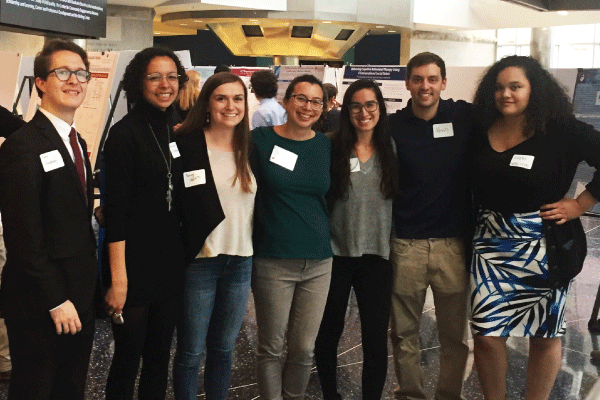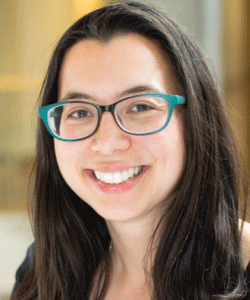Government Relations
Inside Grants: National Institute of Mental Health R15 Research Enhancement Award

Image: Kimberly Chiew with students and researchers from the University of Denver Motivation, Affect, and Cognition Lab.
The U.S. National Institute of Mental Health (NIMH) is one of the leading institutions for mental health research worldwide. A strong supporter of psychological science, NIMH offers many grant opportunities that fund science, enable training, and enhance the research process. In 2020, NIMH’s budget was roughly $2 billion, with most funding going toward extramural research grants outside of NIMH.
Grant Information
- Country: United States
- Organization: National Institutes of Health
- Institute: National Institute of Mental Health
- Grant Mechanism: Research Enhancement Award (R15)
- Amount: $456,753 USD
An important funding mechanism from the National Institutes of Health (NIH), of which NIMH is a part, is the Research Enhancement Award, or R15. These awards support institutions that do not traditionally receive large-scale or substantial funding from NIH. They also emphasize research experiences for students (undergraduate through postdoctoral) by amplifying the research environments of the awardees’ institutions.
Kimberly Chiew, an assistant professor in the Department of Psychology at the University of Denver and the director of the DU Motivation, Affect, & Cognition Lab (dumaclab.org), received the R15 grant in 2018 for her research project titled “Beyond Reward: Approach and Avoidance Motivation Generate Functional Contexts for Cognitive Control and Adaptive Memory.” APS spoke with Chiew about her research, the grant, and more.

Kimberly Chiew
What is the R15 mechanism, and who should consider applying for one?
The goal of the R15 mechanism is to support research projects at educational institutions that provide baccalaureate or advanced degrees to individuals who will go on to pursue careers in scientific research, but that have not traditionally been major recipients of NIH support. To be eligible, your home institution must have received less than $6 million in NIH support in 4 of the last 7 fiscal years. Additionally, the goals of the R15 mechanism are to support meritorious research, strengthen the research environment of the institution, and expose students to research. This makes the R15 a great funding mechanism for research scientists working at institutions with a smaller biomedical research infrastructure. The R15 encompasses two programs: the Academic Research Enhancement Award (AREA) for undergraduate-focused institutions, and the Research Enhancement Award Program (REAP) for health professional schools and graduate schools. Note that these two programs were separated in 2019, after I received my award. My award was written specifically to support both graduate and undergraduate research training.
What are you researching?
I’m a cognitive neuroscientist interested in how emotion and motivation influence cognitive processes, with a focus on cognitive control and memory. The overarching goal of my research program is to advance our understanding of goal-directed human behavior. I see characterizing both motivated control and memory processes and how they interact as key to this understanding. While I use multiple methods to investigate my research questions (including a mix of laboratory and naturalistic paradigms) and have lines of work focusing on both cognitive control and memory separately, my R15 proposal specifically uses fMRI and transcranial magnetic stimulation (TMS) methods to examine and compare neural circuits involved in approach- versus avoidance-motivated cognitive control and subsequent memory, particularly focusing on the role of the prefrontal cortex.
Our goal is to understand how different motivational contexts shape cognitive processes in both the control and memory domain as well as characterize how control processes might shape memory encoding under these contexts. While we’ve experienced some delays related to COVID-19 (including both our fMRI and TMS research facilities temporarily closing due to the pandemic), we’re fortunate to be making progress with the project. Additionally, this project has generated research opportunities for trainees in my lab at the graduate, postbac, and undergraduate level—it’s been a big team effort. I think it’s been particularly exciting for undergraduate trainees new to research to get this exposure to cutting-edge methods in cognitive neuroscience and experience working on a large-scale project together.
How has NIMH funding supported your research efforts?
This project wouldn’t be possible without support from NIMH. Neuroimaging and neurostimulation research are time and resource intensive, and our funding helps cover operating and personnel costs needed for the project to happen. As an early career researcher, this funding really helped jumpstart things and get my research program going.
What was the application process like?
I originally developed this project proposal as part of a K99, an NIH funding mechanism designed to help postdocs transition into faculty positions, that I submitted to NIMH as a postdoctoral trainee. While my K99 was not funded, I got great feedback on my proposal from my reviewers and was able to revise the project to submit for the R15 mechanism as a new faculty member. My program officer at NIMH and mentors at both my postdoctoral and faculty institutions were very helpful in this process. I found the paperwork very daunting during my first time applying for NIH funding (the K99 submission). It was a bit easier when applying for the R15 because of that prior experience.
What advice do you have for researchers applying for NIMH grants or this type of grant mechanism specifically?
The R15 grant mechanism really prioritizes student research training and building the institutional research environment. As such, well-thought-out plans for how the proposed project will provide research training opportunities for students and build synergy with other student learning opportunities at the host institution are very important. Additionally, the R15 has a smaller budget than some other NIH grant mechanisms (such as the R01), so you want to propose a project of appropriate scale. Finally, communicate with your program officer as you are developing your submission—they can provide very helpful feedback on whether your project is in line with NIH funding priorities.
Learn more about the NIMH R15 Research Enhancement Award here.
Interested in learning more about funding opportunities for psychological scientists? Visit the Funding and Policy page on the APS website (psychologicalscience.org/policy) for updates.
Feedback on this article? Email [email protected] or scroll down to comment.





APS regularly opens certain online articles for discussion on our website. Effective February 2021, you must be a logged-in APS member to post comments. By posting a comment, you agree to our Community Guidelines and the display of your profile information, including your name and affiliation. Any opinions, findings, conclusions, or recommendations present in article comments are those of the writers and do not necessarily reflect the views of APS or the article’s author. For more information, please see our Community Guidelines.
Please login with your APS account to comment.